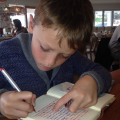Approaching Poetry

When we introduce poetry into our classrooms we need to present it as a celebration of language. We must let our students feel it has the potential to be a great thing for them to enjoy. Poetry is indeed special. Wallace Stevens, the American poet referred to poetry as ‘Simply one of the best things in life.’ Poetry invites the reader, or the receiver to share some of the imagination and wonder of the writer. For a young child, appreciation of poetry grows with exposure and a growing sense of familiarity with the form. There may not be immediate acceptance. An understanding of poetry develops when the child is invited to listen carefully to the language and to notice the patterns and structures used. Once an understanding is established, the inexperienced poet will more readily engage with poetry and begin to experiment with poetry in all its forms. Drawing attention to patterns and structures, rhythms and rhymes means a greater likelihood young poets will embr...

